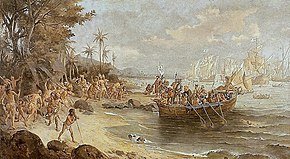1500: Pedro Álvares Cabral Lands in Brazil
On April 22, 1500, Portuguese navigator Pedro Álvares Cabral made a historic landing on the coast of what is now known as Brazil. This event marked a significant moment in the Age of Discovery, as it led to Portuguese colonization in South America. Initially, Cabral’s fleet was en route to India, but they veered far west across the Atlantic, eventually encountering the Brazilian coastline.
The arrival of Cabral and his crew in Brazil had far-reaching consequences. Not only did it expand the Portuguese empire, but it also integrated the region’s vast resources into European trade networks. This had a profound impact on the indigenous populations and the ecological landscape of Brazil.
The Age of Discovery
The 15th and 16th centuries were a time of great exploration and discovery for European nations. Seeking new trade routes to Asia and the riches it promised, Portuguese explorers set sail into uncharted waters. Led by the famous navigator Bartolomeu Dias, who successfully rounded the Cape of Good Hope in 1488, the Portuguese were at the forefront of maritime exploration.
Building on the knowledge gained from Dias’ voyage, Cabral was given command of a fleet of 13 ships and tasked with establishing trade relations with India. However, as fate would have it, Cabral’s journey took an unexpected turn.
The Accidental Discovery
As Cabral and his fleet sailed across the Atlantic, they encountered strong winds and currents that pushed them off course. It was during this unplanned deviation that they stumbled upon the Brazilian coastline. It is believed that the fleet made landfall near present-day Porto Seguro, in the state of Bahia.
Upon their arrival, Cabral and his crew were met by curious indigenous tribes, who had never before encountered Europeans. This initial encounter set the stage for future interactions between the Portuguese and the native peoples of Brazil.
Impact on Portuguese Empire
The discovery of Brazil had a profound impact on the Portuguese empire. It provided the Portuguese with a strategic foothold in the New World and expanded their colonial holdings. The Portuguese quickly recognized the potential of Brazil’s vast resources, including timber, sugar, and precious metals.
Portuguese colonization in Brazil began in earnest, with the establishment of trading posts and the introduction of European agricultural practices. The Portuguese also brought with them their language, culture, and religion, which had a lasting influence on the development of Brazilian society.
Impact on Indigenous Populations
The arrival of the Portuguese had a devastating impact on the indigenous populations of Brazil. European diseases, to which the native peoples had no immunity, spread rapidly, leading to widespread death and population decline.
The Portuguese also enslaved many indigenous people, forcing them to work on plantations and in mines. This exploitation of the native population, coupled with the introduction of European diseases and the disruption of traditional ways of life, had a lasting and detrimental effect on the indigenous peoples of Brazil.
Ecological Impact
The arrival of the Portuguese in Brazil also had a significant ecological impact. The introduction of European plants and animals, such as sugarcane and cattle, led to changes in the local ecosystem. Native flora and fauna were displaced, and new species were introduced, altering the natural balance of the Brazilian landscape.
Deforestation also became a major issue as the Portuguese cleared land for agriculture and logging. This had long-term consequences for the biodiversity of the region and contributed to the loss of native habitats.
Conclusion
The landing of Pedro Álvares Cabral in Brazil in 1500 marked a pivotal moment in history. It not only expanded the Portuguese empire and integrated Brazil into European trade networks but also had far-reaching consequences for the indigenous populations and the ecological landscape of the region.
This event serves as a reminder of the complex and often devastating impacts of colonization. It is important to recognize and understand the historical context in which these events occurred and their lasting effects on the societies and environments they touched.
For more information on the landing of Pedro Álvares Cabral in Brazil, please visit History.com.

